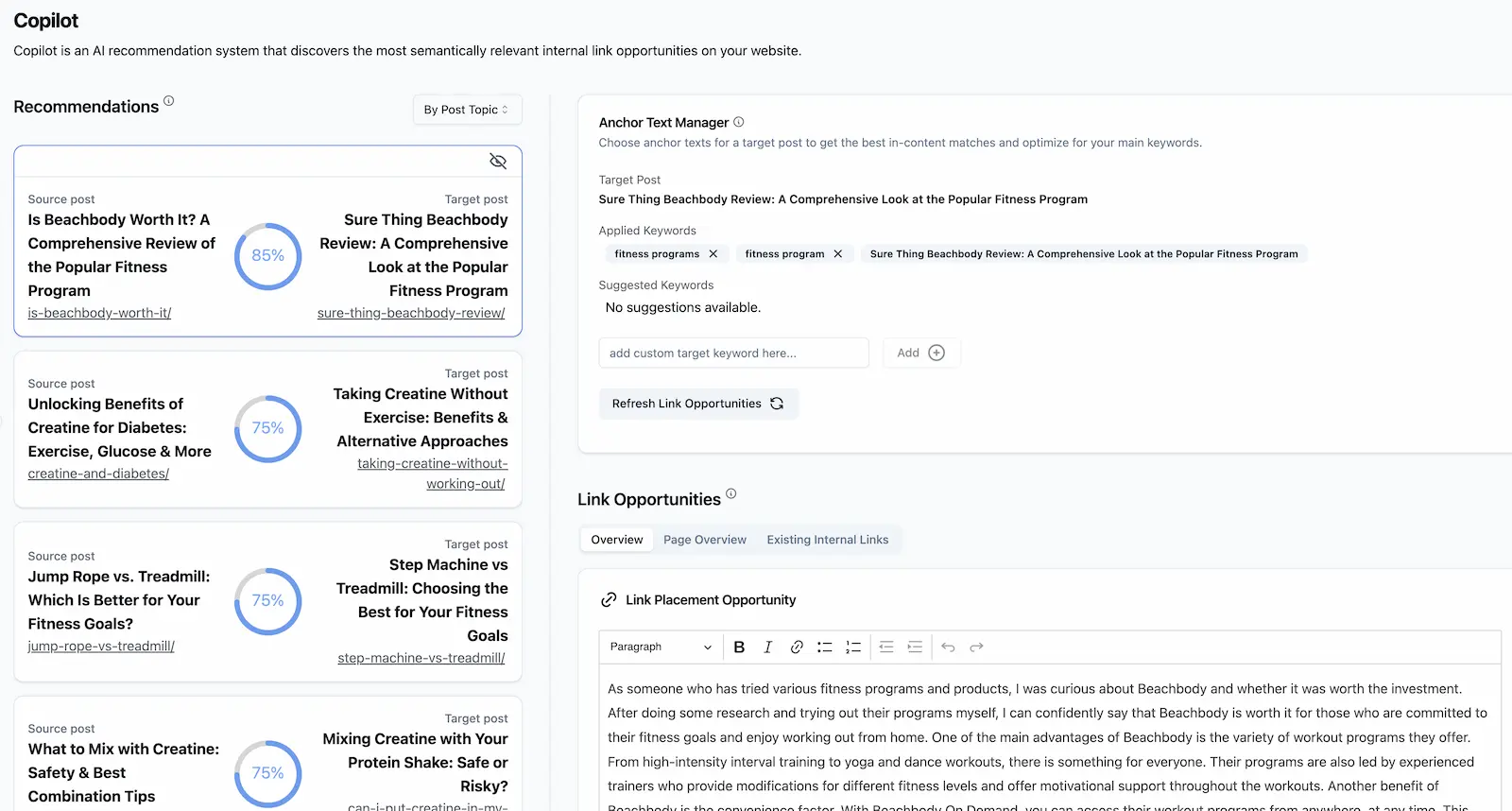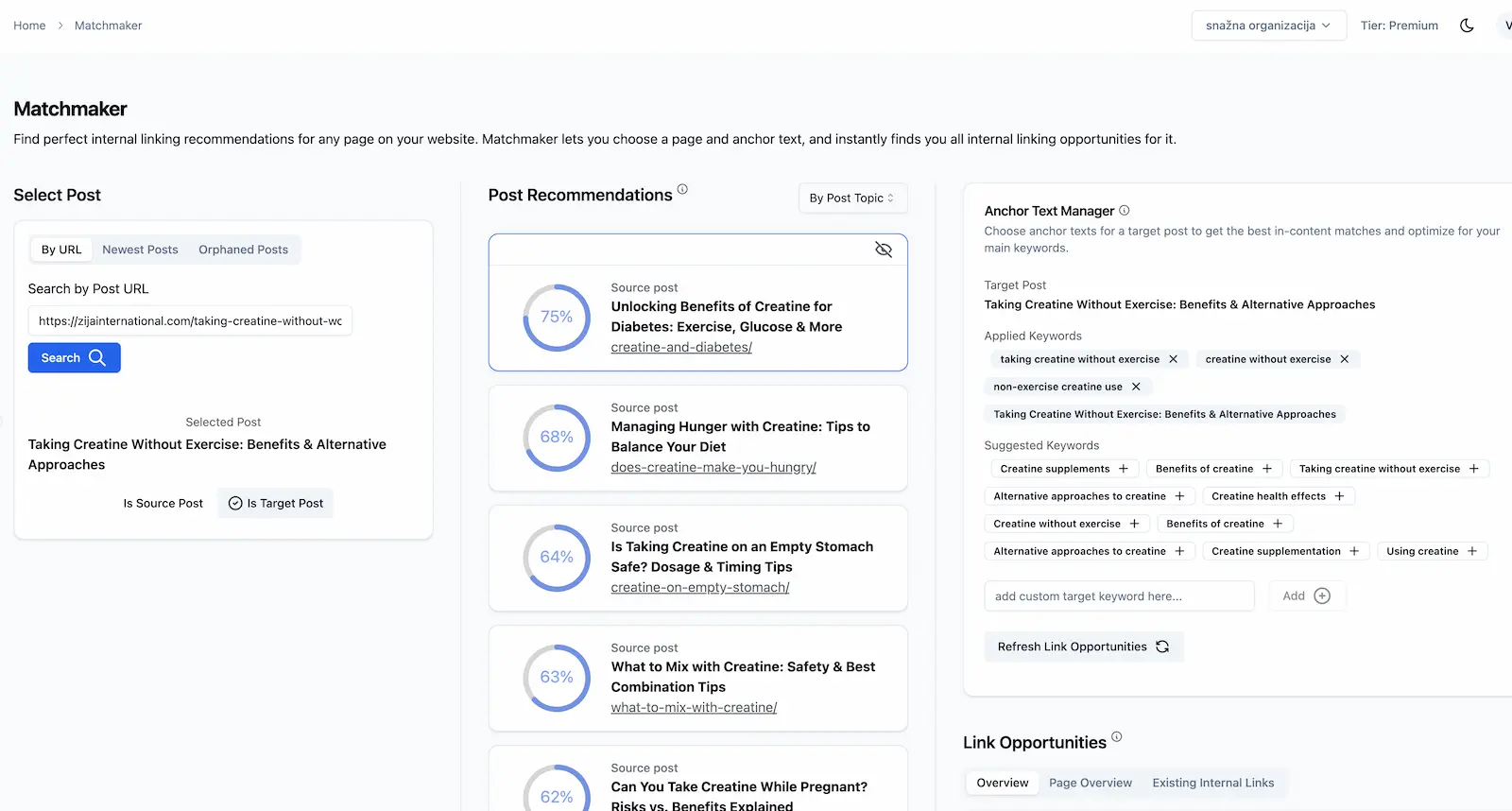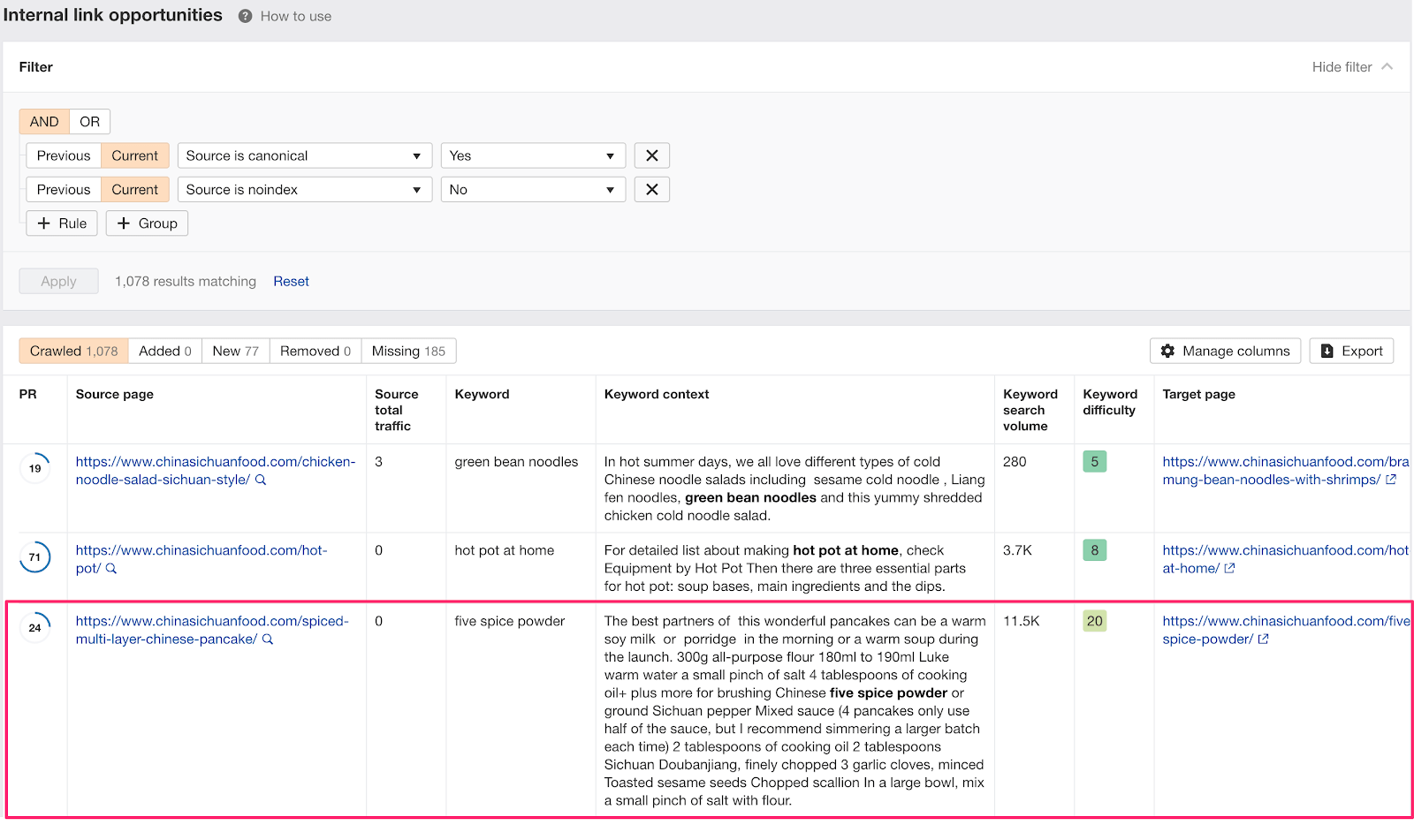As a website owner or an SEO specialist, I am sure you understand the struggle of trying to figure out the internal linking structure of your website.
Maybe you've published a new page and realized it would benefit from being connected to the rest of your site.
Or perhaps a recent audit revealed a number of orphan pages with no internal links.
Trust me, I get it.
I've spent countless hours jumping between spreadsheets, SEO tools, and Google Search Console, clicking through pages like a maze, thinking "There's got to be a better way."
Well, the good news is that there is a better way.
But before I show you how to easily find every internal link opportunity on your site, let me quickly review why internal linking is so important (even if you're an experienced SEO, a quick refresher never hurts).
Why Do You Need a Strong Internal Linking Structure?
The truth is, most website owners don't fully appreciate just how important internal links are for SEO and user experience.
The current studies done around internal linking clearly show a strong correlation between higher rankings and better internal linking structure.
In fact, a study of 23 million internal links across 1,800 websites found that pages with 40-44 internal links received 4x more clicks from Google compared to those with 0-4 internal links.
Anecdotally, we've seen this play out firsthand at Linkter. For every one of our websites, we’ve seen dramatic increases in indexation and rankings when we have applied more and better internal links.
And our clients have been seeing a lot of the same, as well (you can check out their stories in the testimonials).
And yet, time and time again, internal linking remains to be a strategy that gets done poorly. Or even worse - it gets completely ignored.
Why?
It's pretty simple: finding the right internal linking opportunities takes forever.
Think about it - even a small website with 100 pages is like a mini library.
Each page might have thousands of words, and every sentence could potentially link to another relevant page on your site.
Nobody can keep track of all those connections in their head, let alone spot every opportunity for a relevant link.
And that's just for 100 pages. What about websites with 500, 1,000, or even 10,000 pages?
But don't worry - you don't have to figure this out on your own anymore.
Using a combination of machine learning, artificial intelligence, and SEO data, you can now find all your internal linking opportunities in minutes.
Let me show you how.
Meet Copilot - Your Internal Linking Assistant

Let me tell you about something we've built at Linkter AI that's changing the game for website owners and SEOs like yourself.
We call it Copilot, and it's pretty special.
Here's what makes Copilot different: It doesn't just scan your website - it reads and understands every single word on every page.
Just like Google's search algorithms, it looks for meaningful connections between your content.
And the absolute best part is that it ranks these connections from 0% to 100% based on how closely they semantically match.
We built it as a super-smart AI agent who's read every word you've ever published and can instantly spot connections you might have missed.
And when I say instantly, I mean it - Copilot finds dozens (sometimes hundreds) of linking opportunities in minutes, even on websites that already have solid internal linking.
What gets me excited about Copilot is how it brings together three key pieces:
A complete scan and crawl of your website’s posts and pages
Smart content and keyword-based matching built on the same principles Google uses
Real SEO data from your Google Search Console to support its decisions
The magic happens when Copilot starts connecting the dots.
It doesn't just look at obvious topic matches - it understands context, finds related concepts, and spots opportunities that even experienced SEOs might overlook.
The result of this is incredible - every internal linking opportunity is revealed to you.
We built this system because we know what it's like to manage a growing website.
You can't possibly remember every piece of content you've published or spot every potential connection.
That's why we made sure Copilot does the heavy lifting, serving up the most promising linking opportunities based on real data and smart algorithms.
What About Building Links to Just One Page?

You know what question I hear a lot? "What if I just want to build links to a single page?"
Makes sense - sometimes you're working on one specific article and don't want to wade through your entire site's opportunities.
That's exactly why we created Matchmaker (credit for the cool name goes to our co-founder Alex).
It's like having a spotlight that focuses only on the page you care about right now.
Let's say you've got a new blog post about coffee brewing methods.
Pop that URL into Matchmaker, and it'll show you every relevant connection - both pages that could link to your coffee guide and pages your guide could link to.
It's using the same smart tech as Copilot, just zoomed in on one specific page.
When I am building internal links for our own properties, Copilot is my go-to when I want to improve my site's entire internal linking structure.
I start with the pages that'll make the biggest impact and work from there.
But Matchmaker is my best friend when I need to focus on just one page or a handful of specific pages.
Both tools make sure you never miss a relevant internal connection - they just serve different needs.
And the best part is that you won't spend hours filtering through possibilities to find what you need.
The AI does that heavy lifting for you.
What Makes Linkter Different From Other Tools
Look, I've tried pretty much every internal linking tool out there.
And between you and me? They always left me wanting more.
Either they missed key features, or worse - they were clearly built by people who never spent a day doing SEO work.
So when we built Linkter, we focused on fixing the headaches I personally dealt with using other tools. Let me tell you why I think you'll love using it to handle the tedious parts of internal linking.
Getting the Right Links (Not Just More Links)
You know what drives me crazy about most internal linking tools? They throw tons of suggestions at you, but most of them just don't make sense.
Take the current market leader, Link Whisper. In our testing, about 6 out of every 10 suggestions it makes are off-base (confirmed by their CEO).
We took a different path with Linkter.
Instead of just matching keywords, we built AI agents that actually understand what your content means.
Sure, it costs us more to run these sophisticated algorithms, but the results speak for themselves - 9 out of 10 suggestions are spot-on.
The key to getting such high accuracy lies in the foundation of our advanced systems.
While other tools just look for matching words, our system reads and understands your content like a human would.
It spots connections based on meaning, not just matching phrases.
And yes, we're still working on that 1 wrong suggestion out of 10 (perfectionist here 👋), but I'd say we're onto something good.
We chose to invest in better technology rather than cut corners, because at the end of the day, time is worth more than server costs.
Ease of Implementation

When Alex and I sat down to build Linkter, we talked about something that kept bugging us: what happens after you find a good linking opportunity?
You've still got to make that link fit naturally into your content. It's one thing to spot where links should go - that's half the battle.
But you need those links to read smoothly, like they were always meant to be there. Nobody wants robotic-sounding sentences stuffed with awkward links.
This got us thinking.
AI writing was getting better by the day, so we took a chance and integrated OpenAI into Linkter.
We even added a custom prompt field so you can tweak how the AI writes to match your style.
As AI kept getting smarter, we brought Anthropic into the mix too.
Now you've got two powerhouse AI tools helping you integrate those links into your content in a way that sounds like you wrote it.

But you know what's really exciting?
We're getting closer to what we like to call the "Autopilot" feature.
Let me try and paint you a picture. An AI agent that understands your writing style so well, it can add internal links that blend perfectly with your content - no prompting or manual intervention needed.
Just set it and forget it.
Between you and me, we're aiming to roll this out in 2025. .
It's going to change the game completely - imagine having your entire internal linking structure optimized automatically, while keeping your unique voice intact.
Supercharging Our AI with Google's Data
What makes AI really smart and powerful is good data. And when it comes to SEO, nobody has better data than Google Search Console.
GSC knows everything about your website's performance.
It sees which pages are sitting alone with no links to them, which ones Google can't find, and which keywords are getting views but not clicks.
It's like having X-ray vision into your site's SEO health.
So we thought, "Why not feed all this juicy data into Linkter?" And that's exactly what we did.
This opened up some really cool possibilities.
Now Linkter can spot those lonely pages that need more internal links.
But here's the best part - it doesn't just suggest random keywords for your anchor text. Instead, it looks at the keywords that actually matter for your rankings.
Let me give you an example: Say you've got a page about coffee brewing methods. Instead of just linking "coffee" or "brewing," Linkter suggests anchor text based on the keywords that Google already associates with your page.
This means every new link you add is working hard to boost your rankings for terms that really count.
We built a smart anchor text system where you can pick and choose the exact phrases you want to rank for.
This way, every internal link you build is pushing your pages up in search results for the keywords that bring real value to your site.
Other Tools and Strategies You Can Leverage
Look, I get it - maybe Linkter isn't exactly what you're looking for.
That's totally fine!
We built something we're proud of, but there are other ways to tackle internal linking.
Let me walk you through some options I've personally used in the past.
The Old-School Way: Google Search Operators

Before specialized tools came along, most of us relied on Google search operators to find internal linking opportunities.
Just type "site:yourwebsite.com keyword" and you'll see all the pages on your site mentioning that topic.
It works, but it's like trying to build a house with just a hammer - you may achieve something, but there are better and more efficient ways to do it.
Screaming Frog: For The Data Lovers

If you're comfortable with technical SEO tools, Screaming Frog can help map out your site's structure.
It shows you which pages link where, helping you spot gaps in your internal linking.
The obvious downside is that it's more about showing you what exists rather than suggesting new opportunities, or implementing them in a natural way.
Plus, the Screaming Frog’s learning curve is pretty steep if you're not already familiar with technical SEO tools.
Ahrefs: Great For Overall SEO, But...

Ahrefs is amazing for SEO analysis, and yes, it can even moderately help with internal linking.
Their site audit tool spots orphan pages and shows your current internal link structure.But it's a bit like using a Swiss Army knife when what you really need is a specialized tool.
It helps identify certain opportunities but it’s not a tool that focuses on building a robust system that helps you build 100s of quality internal links.
It’s just not Ahrefs specialty.
ChatGPT
I keep seeing people recommend ChatGPT as the answer to all internal linking needs. Or SEO needs. Or… just needs.
It won’t cook your food, Susan, you have to do something on your own!
Whether it's a Custom GPT, their latest project feature, or just a clever prompt - folks claim it's all you need.
Here's the real truth: ChatGPT on its own just isn't built for this.
It can't crawl your site, can't handle your entire website's content at once, and doesn't understand the context of your SEO goals.
We spent 8 months building version 1 of Linkter because solving internal linking properly requires multiple systems working together.
If it could be done with a simple ChatGPT prompt, trust me, we wouldn't have bothered building a whole platform.
By all means, try using ChatGPT - compare what you get from it versus a dedicated system.
The difference will be pretty clear.
Link Whisper and Similar WordPress Plugins
These plugins were some of the first tools to tackle automated internal linking, and they deserve credit for that.
But they're working with limited data and basic matching algorithms that don’t capture so much of the available potential.
They can help you add more internal links, sure.
But they often miss context and suggest links that don't make sense, which means you'll spend a lot of time filtering out irrelevant suggestions.
Plus, who can help you implement these? So far, only Linkter.
What's Your Best Choice?
The right tool depends on your needs:
For small sites (under 50 pages), manual methods might work fine. We even go as far as saying that you are not likely to get a lot of good recommendations from a smaller website, so don’t waste your money on us, we don’t want it!
If you're already using Ahrefs or Screaming Frog, you should test out their internal linking features to see what you can achieve.
For larger sites or if you're serious about SEO, you'll want a specialized tool that can handle the complexity with accuracy and precision.
Whether you choose Linkter or another solution, just make sure you're not letting internal linking slip through the cracks.
It's too important for your SEO to ignore.








